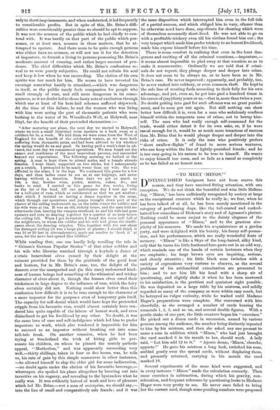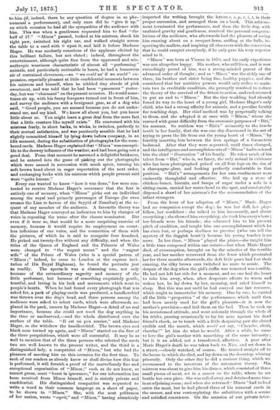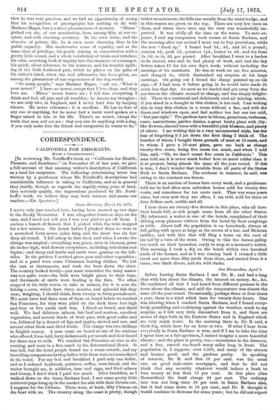"TO MEET 'MINOS.'"
DISTINGUISHED foreigners have n-ot been scarce this season, and they have received fitting attention, with one exception. We do not think the beautiful and wise little Maltese dog, "Minos," has been sufficiently recognised by society at large as the exceptional creature which he really is ; we fear, when he has been talked of at all, he has been merely mentioned in the category of performing dogs, like the tail-coated and cocked- hatted low comedians of Dickens's story and of Agrassot's picture. Nothing could be more unjust to the dainty elegance of the personal appearance of "Minos," and to the gracious sim- plicity of his manners. We made his acquaintaince at a garden party, and were delighted with his beauty, his funny self-posses- sion, and his performances, which are really wonderful feats of memory. "Minos" is like a Skye of the long-haired, silky kind, only that he turns his little feathered fore-paws out in an odd way, which reminds one of the hands of certain lecturers when they are emphatic ; his large brown eyes are inquiring, serious, and closely attentive ; his little black nose twitches with a variety of expressions very curious to observe, as the several problems of his arithmetical examination are presented to him ; and to see him lift his head with a sharp air of questioning, and slightly shake it when be has been answered to his satisfaction, is the prettiest and quaintest sight possible. He was deposited on a large table by his mistress, and mildly regarded so many of the company as were within easy reach, but he betrayed no vulgar curiosity, while he waited until Madame Hager's preparations were complete. She conversed with him cheerfully, as she arranged a number of cards bearing the numerals 1, 2, 3, and so on, and several double figures. With a gentle shake of one paw, the little creature began his "exercises." He picked out a dozen cards in succession, named by various persons among the audience, the number being distinctly repeated to him by his mistress, and then she asked any one present to name a sum in addition which "Minos," who had just brought the card marked 6 in his mouth to her, should work. A lady said, "Let him add 12 to it." " Ajoute dome, 'Minos,' cherche, apporte !" He gave his mistress a long look, twitched his nose, ambled gently over the spread cards, without displacing them, and presently returned, carrying in his mouth the card marked 18.
Several experiments of the same kind were suggested, and in every instance "Minos" made the calculation correctly. Then came exercises in subtraction, during which his gravity, con- sideration, and frequent reference by questioning looks to Madame Hager were very pretty to see. He never once failed to bring her the correct card, though some puzzling numbers were proposed
to him (if, indeed, there be any question of degree in so phe- nomenal a performance), and only once did he "give it up," on which occasion he had all the sympathies of the audience with him. This was when a gentleman requested him to find "the half of 27." "Minos" paused, looked at his mistress, shook his right paw, twitched his right ear, and walked straight across the table to a card with 0 upon it, and laid it before Madame Hager. He was modestly conscious of the applause elicited by this brilliant failure, but not elated ; indeed, throughout the entertainment, although quite free from the oppressed and mis- anthropic weariness characteristic of almost all " performing " animals, and particularly noticeable in bears, he had a humorous air of restrained cleverness,—an "we could an' if we would" ex- pression, especially pleasant at little confidential moments between his mistress and himself, when he nibbled tiny shreds of pink sweetmeat, and was told that he had been " paresseux " yester- day, but was " charmant" on the present occasion. He would some- times sit up, with his funny forepaws turned out in front of him, and survey the audience with a benignant gaze, as of a dog who said, "Good people, you are amused because you do not under- stand me, and my kind. We know all about you, but you know little about us. You might learn a great deal from the mere fact that a little creature like myself exists." He conversed with his mistress freely, in short barks, in winks, in twitches, perfectly to their mutual satisfaction, and was penitently sensible that he had slightly committed himself by lying down before company, in an idle moment, during the substitution of photographs for the num- bered cards. Madame Hager explained that "Minos" was suscepti- ble to the drowsy influence of the weather, and had been going out a good deal. From that moment he assumed a delightful briskness, and he entered into the game of picking out the photographs which were named in succession with much spirit, turning his soft brown head about in eager expectation of the next order, and exchanging looks with his mistress which people present said were "quite human."
Every one wanted to know "how it was done," few were con- tented to receive Madame Hager's assurance that the feat is entirely one of memory, when "Minos" picks out an individual among the royal and princely personages of Europe (he even crosses the Line in favour of the Seyyid of Zanzibar) at the re- quest of any member of the audience. A favourite theory was that Madame Hager conveyed an indication to him by changes of voice in repeating the name after the chance nominator. But even if it were so, that would be a more surprising exercise of memory, because it would require its employment on count- less inflexions of one voice, and the connection of them with the pictures, of which he is said to recognise four hundred. He picked out twenty-five without any difficulty, and when the titles of the Queen of England and the Princess of Wales were changed to "the august mama" and the "august wife" of the Prince of Wales (who is a special patron of "Minos ;" indeed, he came to London at the express invi- tation of His Royal Highness), he found the portraits just as readily. The spectacle was a charming one, not only because of the extraordinary sagacity and memory of the little performer, but because of something exquisitely gentle, trustful, and loving in his look and movements which went to people's hearts. When be bad found every photograph that was asked for, a pack of playing-cards was produced, a handkerchief was thrown over the dog's head, and three persons among the audience were asked to select cards, which were afterwards re- placed in the pack, unseen by Madame Hager—a detail of no real importance, because she could not teach the dog anything in the time or unobserved,—and the whole distributed over the surface of the table. "II eat un peu sorcier," said Madame Hager, as she withdrew the handkerchief. The brown eyes and black nose turned up again, and "Minos" started on the first of the three perquisitions, which were all successful. It may be as well to mention that of the three persons who selected the cards two are well known to the present writer, and the third is a distinguished lady, a compatriot of "Minos," but who had the pleasure of meeting him on this occasion for the first time. To such of our readers as already know or shall divine how this feat is performed, it will furnish a proof of the marvelously fine and exceptional organisation of "Minos ;" such as do not know, or cannot guess, must "burst in ignorance," for our information has been received from Minos himself, and is strictly private and confidential. His distinguished compatriot PM requested to write a word in their common language on a sheet of paper, to be shown to "Mines." She, with the neat politeness of her nation, wrote "esprit," and "Minos," having attentively I inspected the writing, brought the letters e, s, p, r, i, 1, in their proper succession, and arranged them on a book. This achieve- ment terminated the performance, and then the little dog, with unabated gravity and gentleness, received the personal congratu- lations of the audience, who afterwards had the pleasure of seeing him running about on a croquet-lawn, sniffing at the balls, in- specting the mallets, and inspiring all observers with the conviction that he could croquet everybody, if he only gave his very superior mind to it.
"Minos" was born at Vienna in 1870, and his early experience was not altogether happy. His mother, who still lives, and is now exceedingly proud of him, was a strong-minded parent of the advanced order of thought ; and as "Minos" was the sickly one of three, his brother and sister being fine, healthy puppies, and she considered that her nutritive powers would only suffice to main- tain two in creditable condition, she promptly resolved to reduce the theory of the survival of the fittest to action, and endeavoured to put an end to "Minos." But the tiny weakling had already found its way to the heart of a young girl, Madame Hager's only child, who had a strong affinity for animals, and a peculiar faculty for teaching dogs. Her chief method was by perpetually talking to them, and she adopted it at once with "Minos," whom she rescued with great difficulty from the economic purposes of "Bin," his mamma. So ruthless was "Bin's" animosity to the bouche inutile in her family, that she was one day discovered in the act of trying to press the life from out the young heart of "Minos," by forcibly inserting him between the iron springs of a Grossetete bedstead. After that they were separated, until times changed, and the intelligence and accomplishments of "Minos" had rendered him the chief " illustration " of his family. He takes much of his talent from "Bin," who is, we fancy, the only animal in existence who has been photographed poised on all four legs on the rim of a champagne-glass, and looking perfectly comfortable in that position. "Bin's" arrangements for her own confinement were eminently thoughtful and effective. She laid up a store of chicken-bones, biscuits, and lumps of sugar under a sofa in a sitting-room, carried her water-bowl to the spot, and comfortably disposed a shawl of her mistress's for the accommodation of the infant strangers.
From the hour of her adoption of "Minos," Marie Hager had no companion except the dog ; he was her doll, her play- fellow, her confidant ; she talked to him incessantly, and about everything ; she showed him everything, she took him everywhere ; her friends were his friends ; she educated him to his present pitch of erudition, and taught him one accomplishment which he has since lost, or perhaps declines to practise (who can tell the mystery of the doggish heart?) because his young teacher is no more. In her time, "Mines" played the piano—she taught him a little tune composed within one octave—but when Marie Hager died, of consumption, brought on by the miseries of the terrible year, and her mother recovered from the fever which prostrated her for three months afterwards, the deft little paws bad lost their cunning, the silky brown ears twitched no more to music. The despair of the dog when the girl's coffin was removed was terrible. He had not left her side for a moment, and no one had the heart to take him away, when, after desperate efforts to warm and waken her, he lay down by her, moaning, and cried himself to sleep. But this was not until he had essayed one last resource, which ought to immortalise his memory. One by one, be carried all the little " properties " of the performance, which until then had been merely used for the girl's pleasure—it is now the mother's provision—and laid them on the bed. Then he took up his accustomed attitude, and went solemnly through the whole of his tricks, pausing occasionally to lay his nose against his dead friend's cheek, or to touch with a little despairing paw the closed eyelids and the mouth, which would not say, Cherche, cheri, cherche !" let him do what he would. After a while, he came to love the girl's mother with something of the same intensity ; but it is an added, not a transferred, affection. A year after Marie Hager's death he was taken back to Nice, and set down in a street,—closely watched, of course. He trotted straight off to the house in which she died, and lay down on the doorstep, whining piteously. Only the other day he did a curious thing, which we recommend to the inventors of the automaton theory. His mistress was about to give him his dinner, which consisted of three small pieces of meat, set in a saucer on the table, where he sat beside her own plate. She was called away, and detained some time in an adjoining room; and when she returned" Minos "had indeed eaten the meat but he had placed three of his numeral cards in the saucer, and was contemplating the substitutes with a serene and satisfied conscience. On the occasion of our private inter- view he was very gracious, and we had an opportunity of seeing that his recognition of photographs has nothing to do with Madame Hager, but is a sheer phenomenon of memory. "Minos" picked out six, of our nomination, from among fifty, at our re- quest, and with unerring accuracy. In his own home. and the abandon of private life, be is even more charming than in his public capacity. His unobtrusive sense of equality, and at the same time of privilege, his gentle joining in conversation with a pretty little sound, and a whole vocabulary of winks and twitches; his calm, searching look of inquiry into the character of a stranger, his quick, silent reference to his mistress, and his trustful uplift- ing of the little feathered paw, which he places on the palm of his visitor's hand, when the nod affirmative has been given, are among the pleasantest of our experiences of the dog-world.
"So many people," says Madame Hager, "ask me, What is your secret?' I have no secret, except that I love dogs, and they
love me. Minos' never leaves me ; I tell him everything I think and feel, all joys and all troubles ; he knows my thoughts ; we are only two, in England, and I never hurt him by keeping silence. He never rehearses ; it is needless. He has no fear of any one or anything, for he never had a harsh word spoken or a finger raised to him in his life. There's no secret, except the truth that men will not see ; that you can do anything with a dog, if you only make him the friend and companion he wants to be."




































 Previous page
Previous page